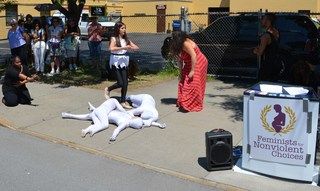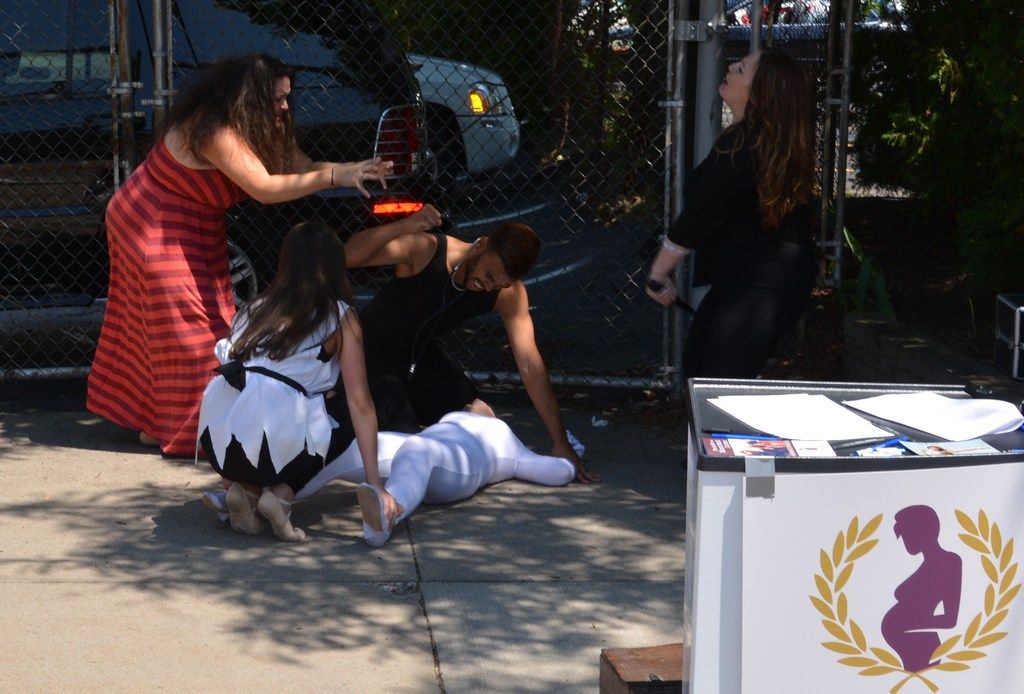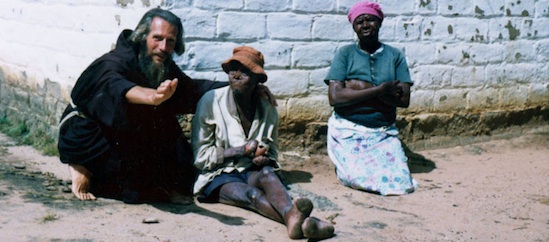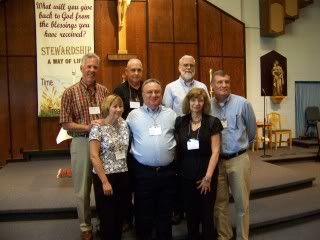Wednesday, July 29, 2015
Tuesday, July 28, 2015
Women Betrayed Rally in Rochester NY
Some images from today's Women Betrayed rally at Planned Parenthood to protest the harvesting of aborted babies' organs for profit, and, of course to support life and women. 125-150 prolifers took part.
The rally included a dramatic dance performance depicting the horrors of an abortion.
There were more there, but they left before this group photo.
Pax et bonum
Saturday, July 25, 2015
Another Margaret Sanger one
The eugenic beliefs of Margaret Sanger
appealed to a certain Austrian paper hanger.
If he was still around to see her Planned Parenthood,
he'd likely declare, "Mein Gott, they're good!"
Pax et bonum
Friday, July 24, 2015
Planned Parenthood clerihews
Dr. Mary Gatter
was coy and even joked amid the chatter,
but her haggling over the price of a baby's heart or liver
made me shiver.
Dr. Mary Gatter
treated it as a laughing matter,
but sell enough baby parts, even that teenie,
and you might afford a Lamborghini.
Pax et bonum
Thursday, July 16, 2015
A few prolife poems
The recent revelation that Planned Parenthood has been selling aborted baby body parts prompted a number of exchanges on social media - you know I couldn't keep quiet! - and even a couple of bad haiku:
Planned Parenthood has
baby body parts for sale – Swift sues for a cut
Planned Parenthood has
baby body parts for sale – zombies lining up
Not good, I know. But topical.
And then there are two clerihews:
Dr. Mary Gatter
was coy and even joked amid the chatter,
but her haggling over the price of a baby's heart or liver
made me shiver.
Dr. Mary Gatter
treated it as a laughing matter,
but sell enough baby parts, even that teenie,
and you might afford a Lamborghini.
And a new one:
Hitler and Stalin
were bawlin'.
It seems abortion doctors had outdone
their best efforts with gas, bomb, and gun.
Those efforts made me wonder about other pro-life poems I've written. A few I recall:
nurse avoids looking
in garbage pail she empties – abortion clinic
praying pro-lifers –
girl entering the clinic avoids eye contact
Mass for life –
tearful woman prays for child she did not have
Holy Saturday –
praying at Planned Parenthood for the emptied wombs
I'm pretty sure there are more. I will search for them. There's also a couple of songs I wrote for a 40 Days for Life opening rally. I need to find those!
A baby by any other name would still have rights
A recent series of exchanges prompted by the revelation that Planned Parenthood is generating income by selling aborted baby parts reminded me of a line from William Shakespeare's Romeo and Juliet:
"A rose by any other name would smell as sweet."
Juliet delivered the line. She was saying that who Romeo was, the essence of this young man with whom she was falling in love, would remain no matter what name he had.
The exchange that reminded me of the line was a pro-choice woman's refusal to refer to the unborn child targeted for abortion as either a child or a baby. She stuck to "fetus."
Now we could compromise. According to Webster's Dictionary, a fetus is human being, so we could just refer to these targets of abortion as human beings. Abortion would then be the killing of a human being.
She avoided dealing with that description. So have other pro-choicers with whom I've debated.
That's dangerous territory for them, because it would be an admission about what abortion really is.
As part of my argument I pointed out that there is historical precedent for refusing to call certain groups of people "human beings."
Slave traders, for example, referred to slaves by such euphemisms as "merchandise" or "cargo" or "goods." To admit that slaves were human beings would have caused problems.
During the Rwandan massacre, the members of the targeted tribe were called "cockroaches."
I once read an account of a U.S. Army officer whose troops slaughtered Native American women and children. When asked why he killed the children, he reportedly responded, "Nits become lice."
During various U.S. wars, troops have come up with alternative names for the enemy - Krauts, Nips, Gooks, Towel Heads, and so on.
All of these euphemisms help to make the targeted groups seem less human. In the case of war, it's a bit more understandable. It's hard to kill someone whom we recognize as a fellow human being. I am not a fan of war, but it does make sense why they feel the need to do this.
But we are not at war with unborn children.
Even if pro-choicers want to call them "fetuses" or "products of conception" or whatever distancing terms they want to come up with, those children remain human beings. That is their essence. That's what their DNA says. That's what common sense says they are.
That's why parents-to-be refer to a child in the woman's womb as their baby. That's why when a woman suffers a miscarriage she will say she lost her baby.
A baby by any other name is still a living human being, with the natural rights due to him or her as a human being.
Pax et bonum
Wednesday, July 15, 2015
John Bradburne, Franciscan poet
As I was preparing material for a Franciscan related event I stumbled across John Bradburne, ofs, who is being considered for canonization. He was also a poet - and you know I'm always on the lookout for Franciscan poets.
In his case, though, he wrote reportedly more than 6,000 poems. Amazing.
First, some details.
A biography based on information in part from the site of the John Bradburne Memorial Society :
John Randal Bradburne was born in Skirwith, Cumbria, England, on June 14, 1921, the son of an Anglican clergyman. He joined the army in 1939, and served in Malaya and Burma, before being invalided home. He underwent a conversion experience in Malaya, and became a Roman Catholic in 1947. He wanted to join the Carthusians, but they turned him down because he had been a Catholic less than two years. Then he got the urge to travel, and for 16 years wandered between England, Italy and the Middle East, reportedly "living out of a Gladstone bag." In 1956, he became a Secular Franciscan.
After all the years of wandering, he wrote to a friend, Father John Dove, in Zimbabwe asking "Is there a cave in Africa where I can pray?" He went there and in 1962 he confided to a Franciscan priest that he had three wishes: to serve leprosy patients, to die a martyr, and to be buried in the habit of St Francis.
In Zimbabwe he became a missionary helper, and in 1969 he was appointed warden at the Mutemwa Leprosy Settlement
He battled management over the care and treatment of the residents, and was eventually fired. He then lived in a prefab tin hut, lacking water and sanitation, just outside the leprosy compound. From there he continued to help the lepers as much as he could.
As a Secular Franciscan, he sang daily office of Our Lady, rose at dawn for Matins, and ended his day with Vespers and Compline.
During the Zimbabwean civil war, his efforts to prevent exploitation of the leprosy patients brought local hostility and suspicion. He refused to leave the place for safety and was abducted and on September 5, 1979, he was shot and killed. Some who know him or of him call him a martyr, which would certainly start him on the path to canonization.
Since his death many unusual events have been reported in relation to his name. His lasting legacy is that Mutemwa is now a place of pilgrimage, and there is a growing movement in support of his cause for sainthood.
So now for the poetry.
I have read very little of it, so I can't attest to its quality yet. But here are a few excerpts from his poems:
An artist on his canvas looks
And masters what he sees,
At writer making brighter books
Gazes each page to please:
So too The Father at the Son's
Image of Him delights, and ones
Through Love Proceeding tween the Twain
Son with The Father back again.
(from "Sitting on a Log:)
I universal am, reverse my name
And backwards barks it "God!", so call me then
By sound less holy, hollow "Hound!", - I men
Befriend from end to end, make world the same
Throughout thereby and homely everywhere
Becomes if I am present, ...
(from "Dog")
Francisca is the stillest spirit here
Indwelling with a body passing frail,
To her I think the cry of chanticleer
Frequently means an archangelic hail!
(from "Francisca (1972)")
More to read and explore.
Pax et bonum
Thursday, July 9, 2015
The fourth anniversary of my Secular Franciscan profession
Four years ago today I professed as a Secular Franciscan, one of the happier moments in my life (with marriage, births of daughters, of course!).
Being a Franciscan has helped my spiritual life, and has influenced my behavior. A combative, sarcastic sort, I've found myself constantly evaluating my words and actions in light of my Franciscan vocation.
What would Francis do!
Above, the good-looking one and my late father-in-law celebrate with me. Below, me with the others who professed that day at St. Leo's Church in Hilton.
Alleluia!
Pax et bonum
Monday, July 6, 2015
We need more "good" movies that are good
The Good Looking One and I went to see the latest Christian movie, Faith of Our Fathers. It contains the usual "good" movies elements: sincerity, positive messages about faith and family, upbeat and hope-filled ending.
But ...
Esthetically, artistically, it's not a good movie. Too many plot holes and plausibility gaps. Continuity issues. Uneven acting. Set problems. Flawed dialogue.
I could go on - I'm probably one of those intellectual snobs the makers of these films eschew, and often turn into the foils and villains in these films.
Because I'm not focusing on the good message.
Now, let me say that the movie is not outrageously bad. It's not down in Ed Wood territory. It's not even as bad as some of the SyFy and Hallmark made-for-television movies.
But it's just not that good.
Take, for example, the letters that are central to the plot. We see soldiers in 1969 Vietnam scribbling the notes on small pieces of paper using pencils as torrential rain pours down (forget for a moment that in some of the rain scenes the sun is clearly shining and it's obvious the "rain" is being provided by machine!). Now, we see the letters in 1997 - on larger paper, in envelopes, clearly legible with no signs of having been written in a rain storm or no obvious signs of the passage of years.
That's the kind of thing I'm talking about. Such elements undermine the credibility of the film, and interfere with the fine message. The message is still there, and enough of it comes through that that alone helps to raise it above the poorer SyFy and Hallmark efforts.
I've seen too many flawed Christian films. They rely on sincerity and message rather than good filmmaking. Admittedly, they are often handicapped; The big money folks of the film industry tend not to put up the money needed to hire name actors and writers, to invest in quality props and special effects for these kinds of movies. Name actors often don't want to be involved with such projects, and the low-budget filmmakers have to rely on believers, lesser actors and even amateurs.
Oh, sometimes there are films that do get the support and succeed - Babette's Feast, The Mission, A Man for All Seasons come to mind. They each had a message, but they let good film making tell the story. Even a lesser effort like The Way still keeps filmmaking in mind.
I am glad there are movies like Faith of Our Fathers. I salute the effort. But if the folks behind these films want to reach a wider audience, to really catechize and proselytize, they need to make better movies.
Being well-meaning is not enough.
Pax et bonum
Sunday, July 5, 2015
Don't like abortion? don't have one then.
Don't like abortion? don't have one then.
Mind your own business.
Glad that's that sorted
A comic tweeted the above in response to the "Rally for Life" effort in Ireland. It's always hard to tell when someone is joking and when someone is serious, but given some of his other comments it seems safe to say he's on the pro-abortion side.
The thing is this is a common slogan/argument voiced by the pro-abortion camp. My responses to the tweeting comic included:
Don't like murder? Don't commit one.
Mind your own business.
Don't like theft? Don't steal.
Mind your own business.
Don't like child abuse. Don't abuse.
Mind your own business.
Don't like sex abuse? Don't abuse.
Mind your own business.
Don't like animal cruelty. Don't be cruel.
Mind your own business.
Don't like selling substandard products? Don't sell them.
Mind your own business.
(Unintended word play on that last one!)
I could have gone on, but I think I made my point.
The argument is absurd. It's really just a way to avoid intelligent discussion of the issue. My tweets were intended to show the flaw in the reasoning - or lack thereof - behind the argument and the failure to think through its implications.
The only person this statement would make sense for is a total anarchist.
Pax et bonum
Saturday, July 4, 2015
Holidaze ...
I like most holidays. They give us a chance to celebrate important people and events.
Fourth of July. Thanksgiving. Christmas. New years. Easter. Labor Day. Memorial Day. Birthdays get in the mix, too.
I enjoy small family gatherings, simple meals with maybe some special foods, carrying on traditions, watching a favorite movie. We've had a number of those, and those are the ones I remember best.
Alas, sometimes the celebrating part that sometimes gets to me, though, especially when they involve others from outside the family.
Fireworks that frighten the dog. Lots of people who stay and stay when I'd really rather be alone. Cards and e-mails sent out of obligation and not always out of real desire. Neighbors' loud late night parties with bonfires, fireworks, and yelling as I try to sleep.
And sometimes my poor wife gets in a dither, especially after she became the "matriarch" of the family. She feels obliged to prepare an elaborate feast with multiple dishes, and since there are no other moms in the family any more, she prepares it all herself. I offer to help - no, she wants to do it. I suggest we cut down on the numbers invited or the amount of food prepared . Oh no, we can't leave anyone out, and we need to have enough to feed everyone and send them home with leftovers.
I invariable get called in when she gets behind and overwhelmed, or forgot something from the store. We invariably toss out leftovers that didn't get eaten after a week has passed. She invariable gets mad on the day and mad at the waste when the excess food gets tossed, and complains that she's done, someone else has to host this from now on, she getting too old, etc., etc.
And the next holiday ... she wants to do it again.,
What I'd like is a quiet day. Just the wife, the dog, and me. A simple meal. A glass of beer (or wine for the wife). A favorite movie.
And no neighbors imposing their noisy brand of celebrating.
That would be a real holiday.
Pax et bonum
Wednesday, July 1, 2015
Sanctuary! Sanctuary! ("The Bean Eaters" and Same Sex Marriage)
I recently finished reading The Bean Eaters by Barbara Kingsolver. Actually, it's a matter of rereading - I'd read it years ago, and now that it's on the reading list for a course I've been assigned I had to read it again.
I always enjoyed the book, so that wasn't a problem (I recommend it, by the way).
One of the subjects the book deals with is the Sanctuary movement of the 1980s. At the time, the U.S. government, in the name of fighting communism, supported a number of repressive regimes in Central America. Those regimes, or the death squads they permitted and supported, murdered a number of people for crimes like forming labor unions or supporting the poor. The dead included Blessed Oscar Romero, who was murdered because he spoke out. And Jean Donovan and Sisters Dorothy Kazel, Maura Clark, and Ita Ford, were murdered by Salvadoran National Guardsmen for their work on behalf of the poor.
As a result of the murders and the oppression, a number of Central American people fled to the U.S. two of the characters in the novel were such refugees. But because of the U.S. government's support for the Central American governments, the U.S. government refused to grant these fleeing people refugee status - to do so would be to admit we were supporting dictators and murderers. So the Sanctuary Movement began. Individuals, organizations, and churches helped to smuggle and hide the refugees. Such actions were illegal, and the people involved could be arrested.
My parish at the time was part of that network, despite the risks. We hid a family - we knew them as the Gomez family - for many months, along with support from other local churches. I was not part of the direct hiding of the family, though I voted in favor of it and we supported what the church was doing. In fact, we had a party at our house and the Gomezes were among the guests. I still remember the father, Alejandro, telling one of my daughters who was prone to touching the animals too much, "No molesta da kitty." And I was part of the delegation representing the parish as a local Unitarian church was discussing becoming part of the movement. I recall one man getting up before the congregation pleading, "Even the Catholics are doing this." They voted no anyway; people did not want to break the law. The government caught up with the Gomezes, attempted to deport them, but members of the movement managed to smuggle them to safety in Canada. None of us were ever charged in connection with this, though we did not know for a while that we wouldn't.
I was thinking about those days thanks to the book, but also because of all the talk about what might happen to people of faith in light of some of the recent government actions, especially the Supreme Court decision concerning same sex so-called marriage. There have already been fines and lawsuits. What's going to happen in the future is unclear, but people are concerned. It would be a sanctuary moment involving smuggling people, but it could result in harassment, curtailment of free speech rights, more suits and fines, loss of business and jobs, and so on.
And the way things are going, the churches won't be able to offer sanctuary: They may be targets themselves.
Pax et bonum
Subscribe to:
Posts (Atom)











